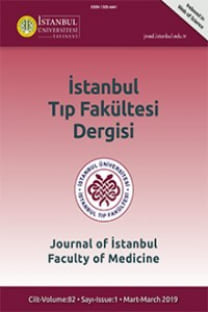SPİNAL ANESTEZİ SONRASI GÖRÜLEN KOMPLİKASYONLARIN DEMOGRAFİK DAĞILIMI VE HASTA MEMNUNİYETİ
Giriş: Hasta memnuniyeti, günümüzde, bütün tıp bilimleri için büyük önem ve öncelik taşıyan bir konudur. Spinal anestezi ile ilişkili hasta memnuniyeti de anesteziyoloji için önde gelen konulardan birisidir. Spinal anestezi sonrası görülen komplikasyonların demografik dağılımı, hasta memnuniyeti ve bu düşüncelerin hastalar tarafından bize yansıtılmasının, hastalarımızın yaşadığı coğrafi bölgelerle ile ilgili olarak farklılıklar gösterdiğini gözlemlemekteyiz. Bu nedenle, spinal anestezi uygulanan vakalarda hasta memnuniyetini araştırmayı hedefledik. Gereç ve yöntem: 236 hastayı kapsayan prospektif gözlemsel bir çalışma gerçekleştirildi. Spinal anestezi uygulanmış hastalar 7 coğrafi bölgeye göre sınıflandırıldı. Hasta memnuniyeti ve komplikasyonlar açısından değerlendirildi. Operasyonu takiben 2., 6., 12., 24. saatlerde ve 7. günde gelişen komplikasyonları ve hasta memnuniyeti sorgulandı. Bulgular: Hastaların en çok Marmara (%24,6) ve Karadeniz bölgesinden olduğu görüldü (%22,9). Spinal anestezi memnuniyeti anlamlı olarak yüksek (n:171; %72,5) (p < 0.001) bulundu. Genel olarak en sık görülen komplikasyonlar ise 63 hastada bulantı-kusma (%26,7) ve 52 hastada bel ağrısı (% 20,1) olarak saptandı. Sonuç: Hastaların spinal anestezi için sorgulanan şikâyet veya memnuniyetlerinin ifadesinde çeşitli faktörlerden etkilendiği tespit edildi. Bu nedenle spinal anestezi planlanan hastalara girişim öncesi, daha geniş ve etkin bilgi verilmesi ve hastaların operasyon sürecine daha aktif katılımlarının sağlanmasının hasta memnuniyetini arttıracağı kanısındayız.
Anahtar Kelimeler:
Spinal anestezi, komplikasyonlar, hasta memnuniyeti
DEMOGRAPHIC DISTRIBUTION OF COMPLICATIONS AFTER SPINAL ANESTHESIA AND PATIENT SATISFACTION
Objective: Patient satisfaction is an important issue for all medical sciences. Spinal anesthesia associated patient satisfaction is a prominent subject for anesthesiology. Demographic distribution of the patient satisfaction, reflection of patients’ thoughts and complications seen after spinal anesthesia may show some variations with respect to geographic region. Therefore, we aimed to investigate the patient satisfaction for cases undergone spinal anesthesia.Material and Methods: We performed a prospective observational study involving 236 patients. Patients, who had spinal anesthesia for their surgery, were separated into 7 geographical regions and patient satisfaction and minor complications were reviewed. After the surgery, we questioned complications and patient satisfaction in the 2nd, 6th, 12th, 24th hours and 7th day of the operation. Results: Most of our patients were from Marmara (24.6%) and the Black Sea region (22, 9%). Patient satisfaction from spinal anesthesia was significantly high (n: 171; 72, 5%) (p<0.001). Most common minor complications were nausea and vomiting for 63 patients (26, 7%) and low back pain for 52 patients (20, 1%). Conclusion: Patients questioned for their spinal anesthesia experience showed wide variations about their approach to their own minor complications and their expression of satisfaction. Patient satisfaction is affected by several factors and remains in a conceptual confusion. We believe that, if a more extensive and actual information is given to patients prior to regional anesthesia intervention, this can reduce confusion and improve patient satisfaction
Keywords:
Spinal anesthesia, patient satisfaction, complications,
___
- Kettner SC, Willschke H, Marhofer P, Reilly CS.
- Does regional anaesthesia really improve outcome. Br J Anaesth. 2011 Dec;107 Suppl 1:i90-5. Review.
- Dharmalingam TK, Ahmad Zainuddin NA. Survey on Maternal Satisfaction in Receiving Spinal Anaesthesia for Caesarean Section. Malays J Med Sci. 2013 May;20(3):51-4.
- Lee A, Gin T. Educating patients about anaesthesia : effect of various modes on patient’s knowledge , anxiety and satisfaction. Curr Opin Anaesthesiol. 2005 Apr;18(2):205-8.
- Lehmann M, Monte K, Certified C, Nurse R, Barach P, Associate MPH, et al. Postoperative patient complaints: a prospective interview study of 12, 276 patients . J. Clin. Anesth.; 2010;22(1):13–21.
- Luger TJ, Kammerlander C, Gosch M, et al . Neuroaxial versus general anaesthesia in geriatric patients for hip fracture surgery: does it matter? Osteoporos Int 2010;21:S555-72.
- Myles PS, Williams DL, Hendrata M, Anderson H, Weeks AM. Patient satisfaction after anaesthesia and surgery : results of a prospective survey of 10 811 patients . British Journal of Anaesthesia 84 (1): 6–10 (2000)
- Parker MJ, Handoll HH, Griffiths R . Anaesthesia for hip fracture surgery in adults. Cochrane Database Syst Rev 2004 Oct 18;(4):CD000521.
- Rhee WJ, Chung CJ, Lim YH, Lee KH, Lee SC. Factors in patient dissatisfaction and refusal regarding spinal anesthesia. 2010;59(4):260–4.
- Schwabe K, Hopf H, . Persistent back pain after spinal anaesthesia in the non-obstetric setting : incidence and predisposing factors. Br J Anaesth. 2001 Apr;86(4):535-9.
- Sindhvananda W, Leelanukrom R, Rodanant O, Sriprajittichai P. Maternal satisfaction to epidural and spinal anesthesia for cesarean section. J Med Assoc Thai 2004; 87: 628-35.
- Webster F, Bremner S, Mccartney CJL. Patient Experiences as Knowledge for the Evidence Base A Qualitative Approach to Understanding Patient Experiences Regarding The Use Of Regional Anesthesia For Hip And Knee Arthroplasty. Reg Anesth Pain Med. 2011 Sep-Oct;36(5):461-5.
- Wu CL, Naqibuddin M, Fleisher LA. Measurement of patients satisfaction as an outcome of regional anesthesia and analgesia: a systematic review. Reg Anesth Pain Med 2001; 26: 196-208.
- Başlangıç: 1916
- Yayıncı: İstanbul Üniversitesi Yayınevi
Sayıdaki Diğer Makaleler
METROPOLDE 112 ACİL SAĞLIK HİZMETİ
Banu KARAKUS YILMAZ, Banu YILMAZ KARAKUŞ, Erdem ÇEVİK, Hatice DOGAN, Mehmet SAM, Ahmet KUTUR
NONTRAVMATİK RABDOMYOLİZE BAĞLI BİR AKUT BÖBREK YETERSİZLİĞİ OLGUSU
Yavuz FURUNCUOĞLU, Tevfik Ecder, Alaattin YILDIZ, Aydın TÜRKMEN
SPİNAL ANESTEZİ SONRASI GÖRÜLEN KOMPLİKASYONLARIN DEMOGRAFİK DAĞILIMI VE HASTA MEMNUNİYETİ
Sezer YAKUPOĞLU, Mehmet BÜGET, Filiz TÜZÜNER, Süleyman KÜÇÜKAY
AKUT APANDİSİT ÖN TANISIYLA GÖZDEN KAÇIRILMIŞ HETEROTOPİK GEBELİK
